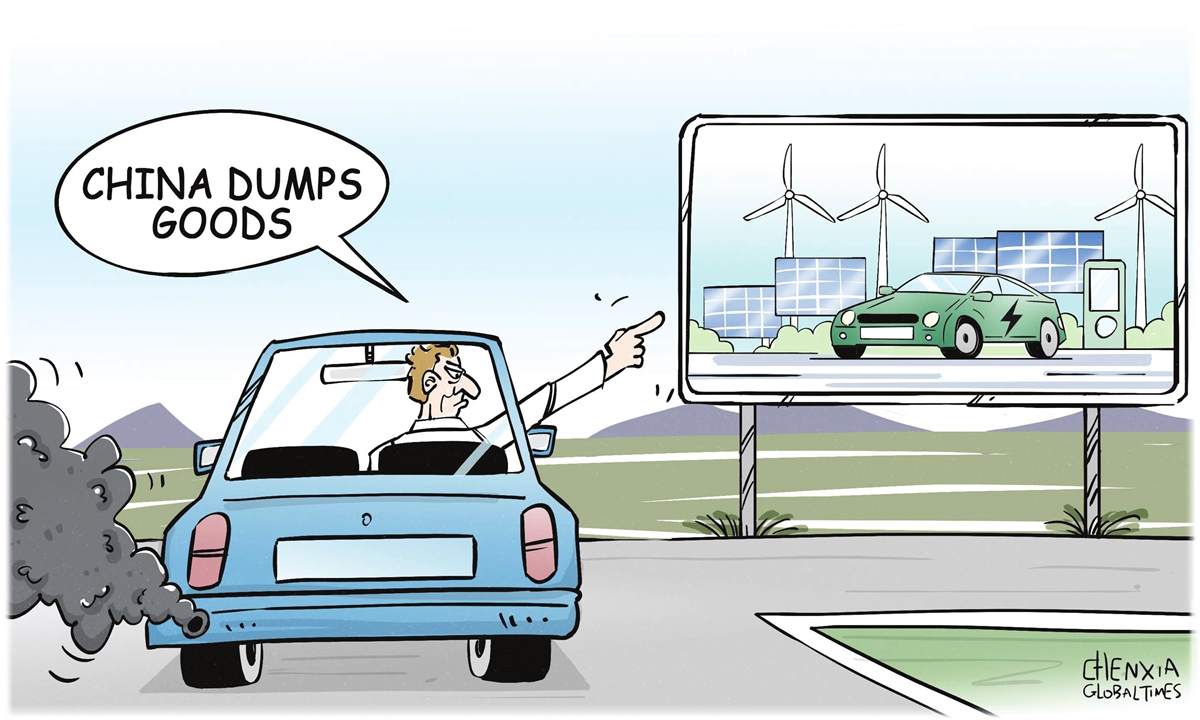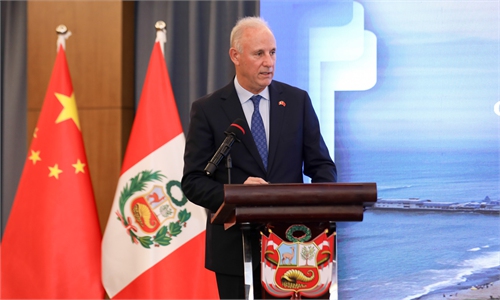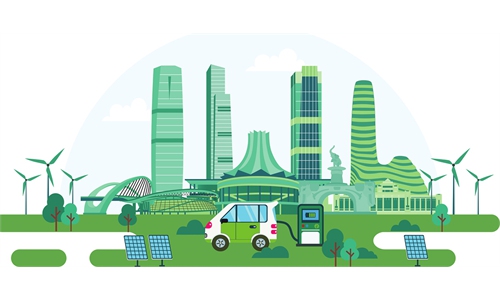OPINION / GLOBAL MINDS
West stuck in present while China sees the future

Illustration: Chen Xia/GT
Over the last two years, there have mounting accusations in the West that China is guilty of dumping its goods at uncompetitive prices on Western markets. This criticism has largely been directed at the new green technology industries, in particular solar power, wind turbines, and, most notably, electric vehicles. It is true that China, especially in a much earlier period, gave large-scale financial assistance to EV manufacturers and, until the end of 2022, subsidised the purchases of EVs, as quite a few other countries did. But the idea that these subsidies are the reason for the remarkable competitiveness of Chinese EVs is a fantasy.There are three key reasons for China's competitiveness. First, electric vehicles, like solar panels and wind turbines, were a key component of the 'Made in China, 2025' launched in 2015. China's success in EVs is a textbook example of China's long-term thinking, which, with the notable exception of Tesla, is almost completely absent in Europe and the US. There, manufacturers preferred to think short term and continue to benefit from the high profitability of internal combustion engine products for as long as they could. China saw the future: Western manufacturers were stuck in the present. And the latter are now paying the price.
Second, the Chinese market is huge and the most competitive in the world. For much of the twentieth century, the same could be said of the US market, compared with Europe. The hyper-competitive nature of the Chinese market is constantly ignored in the West, no doubt because it undermines age-old cliches about what a socialist economy is supposed to be like. The complexity and dynamism of China defies such prejudices. The EV sector is subject to cut-throat competition with most firms destined not to survive.
The third reason is the continuing priority that China attaches to the industrial sector. China is the only country in the world that is represented in every major industrial sector. That is why China, unlike the West, could supply the world with virtually everything it needed during the pandemic. The West has long neglected its industrial sector. The classic example is the United States, which is now in a state of angst over the decay of its shipping industry and the extraordinary crisis that has befallen Boeing, its sole producer of commercial aircraft. The financialization of the Western world, above all the US, in the single-minded pursuit of profit, has led to the abject state of manufacturing.
Meanwhile, China is reinventing the nature of the industrial process. The spectacular success of BYD is not the result of government subsidies but the birth of a new kind of company, hugely efficient and cost-effective, highly innovative, a combination of car maker and battery producer, with a quite new kind of global reach, that will dominate the global EV industry for many years to come. If Ford invented mass production early last century, then BYD is doing the same for the new era of electric vehicles, while acting as a model for other sectors. The economic revolution now underway in China is not restricted to one company or industry, it is about the new era of decarbonisation and the new green industries, including wind turbines and solar power, which, together with new forms of consumption and living, will define a new epoch of human development. China is thinking in exactly these terms and leaving the West far behind in the process. To add insult to injury, the entire world, including the West, will over time, become overwhelmingly dependent on the products of China's green technology, in particular EVs, wind turbines, and solar panels, in order to achieve carbon neutrality.
Instead of berating China for misdeeds it is not guilty of, the West should be taking a leaf out of China's book and seeking to learn from it. Ultimately it will have no alternative, otherwise it will be out-competed in sector after sector. Although the West will find it desperately difficult to admit, the process has already started. America has begun, tentatively, to discuss the idea of an industrial strategy, some European countries likewise, and the inspiration, whether they admit or not, is China. This takes us back to 'Made in China, 2025'. It is patently clear that this was never taken seriously in the West. The deeply rooted assumption was that China was a developing country incapable of innovation and doomed to remain in the foothills of economic development, dependent on cheap labour and borrowing from the West. The latter simply did not believe that China could make the giant leaps in technology that it has achieved over the last decade.
They cry foul when in fact the only thing China is guilty of is doing what any developing country in its position would do: learn and apply. Meanwhile, the West, in a desperate attempt to prevent what they never dreamed of happening in the first place, is seeking to prevent China, or at least forestall it, from continuing its technological transformation. Blocking Chinese access to state-of-the-art technology is just a latter-day form of protectionism. As King Canute failed to halt the tide, so the West will fail ignominiously to prevent China's rise.
The author is a visiting professor at the Institute of Modern International Relations at Tsinghua University and a senior fellow at the China Institute, Fudan University. Follow him on X @martjacques. opinion@globaltimes.com.cn



